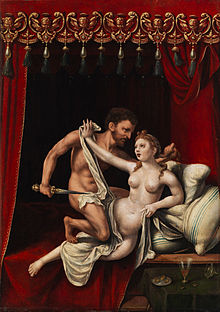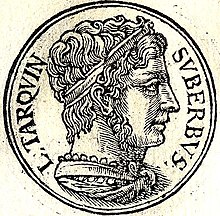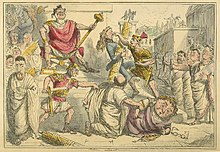Lucius Tarquinius Superbus
Lucius Tarquinius Superbus († c. 495 BC), according to legend, came from the Tarquinian family and was the seventh and last king of Rome. He reigned from 534 BC and, according to tradition, was exiled from Rome in 509 BC.
Tarquinius is one of the three Etruscan kings in Rome whose historicity is doubted by some ancient historians, but largely accepted by Etruscology, at least in essence. He is regarded as the grandson of the Roman king Tarquinius Priscus (616-578 BC) and succeeded his father-in-law Servius Tullius (578-534 BC) on the throne after Tullia, Tarquinius' mistress and Tullius' daughter, had her father murdered. Tarquinius, it is said, systematically eliminated his domestic opponents as well as all potential avengers for Tullius' murder in Rome and reversed political reforms of his predecessor. He is so clearly portrayed in later tradition as an almost typical tyrant that it is difficult to separate fact from fiction even if one assumes that he is based on a real historical figure.
In terms of foreign policy, Tarquinius allegedly pursued an extensive expansion policy that extended the territory of the Roman city-state to Terracina. He is also credited with building projects in Rome such as the expansion of the city wall, the construction of sewers (Cloaca Maxima) or the construction of the temple of Jupiter on the Capitol. In order to get the money for the wars and magnificent buildings, he allegedly had many rich nobles murdered - a typical accusation against tyrants.
Livius' work of history ab urbe condita contains the following (indisputably legendary) narrative:
Tarquinius pushed it so far with the murders of nobles and other abuses of his power that the gods decided to show their anger in an omen. Therefore, a snake crawled out of a wooden pillar in the royal palace, terrifying the royal family. This omen troubled even Tarquinius. He sent his two sons and his sister's son, Lucius Iunius Brutus, to the oracle at Delphi. Tarquinius' sons thought their cousin was limited. To avoid possible attacks from the king, Lucius Iunius had deliberately hidden his intelligence behind a lot of less intelligent actions, which had earned him the nickname Brutus ("fool", "fool").
After the three had arrived in Delphi, they - according to the order of Tarquinius Superbus - first asked the oracle about the meaning of the serpent's omen (the oracle's answer to this point is interestingly not handed down in the sources at all), but added a question on their own behalf, namely, who (of them) would take over the rule of Rome after the death of their father. The oracle answered that the first to kiss the mother would be the next ruler of Rome. Tarquinius' sons believed that "mother" meant their biological mother, but Lucius Iunius Brutus realized that the oracle had not been speaking of the physical mother, but of the common mother of all men, the earth. As they left the oracle, Lucius pretended to trip out of clumsiness, fell to the ground, and unnoticed gave the earth a kiss.
Tarquinius Superbus' tyrannical regime and an opposition within the Roman patriciate that was growing stronger because of it led, according to late sources, to the banishment of the king and his family from Rome around 510/09 BC (or 508/507 BC; Roman tradition probably borrowed from the overthrow of the tyrant Hippias in Athens), while he besieged the Latin city of Ardea (36 km south of Rome) as part of his expansionist policy. The occasion for the revolt was supposedly (Livius, ab urbe condita 1,56-60) the rape of Lucretia by Tarquinius' son Sextus, which was seen as further unmistakable evidence of the depravity of the royal family. The rebels were led, it is said, by Lucretia's husband Lucius Tarquinius Collatinus, who-as the second element of his name indicates-was himself a member of the royal family (in the broader sense), and his friend Lucius Iunius Brutus.
The banishment of Tarquinius Superbus marked the end of kingship in Rome and the beginning of the Roman Republic in the eyes of later Romans. According to the oracle, Lucius Iunius Brutus and Lucius Tarquinius Collatinus became the first consuls of Rome. Whether there are real historical events behind this legend is, as already mentioned, very controversial since the 19th century.
Tarquinius is said to have later tried to regain power in Rome with Etruscan and Latin help (→ Latin Wars), but without success. After his fall, he is said to have retreated via Gabii and Clusium to the Etruscan Caere, where the family of the Tarchna ("Tarquinii") (as possible descendants of the king?) is still attested in the 3rd century BC.

Sextus Tarquinius harasses Lucretia, 16th century.

Fantasy portrait Promptuarii Iconum Insigniorum, 1553

Tarquinius Superbus makes himself king in The Comic History of Rome, c. 1850.
Search within the encyclopedia